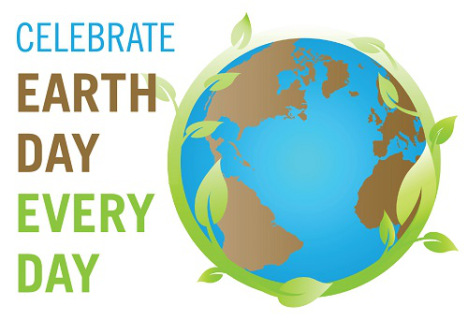Today April 22, 2015 is Earth Day! Since its inception in 1970, Earth Day has been a great reminder to celebrate the Earth, nature, and more natural living, however you don’t have to wait for Earth Day to start. Make a plan daily to do something to celebrate the Earth’s biodiversity and help towards protecting our amazing planet!
As parents we can set an example for our children. Children learn about strong character when parents and other adults in their daily lives set a good example through their own behavior and actions. Going Green and giving back to the environment starts at home.
If you are looking for ways to go Green today and everyday here are a list of ideas:
Recycle
When you don’t recycle, it goes into the trash, and get buried. It stays there forever, basically.
Recycling and Reusing More Plastics:
According to the U.S. Environmental Protection Agency, the average American produces approximately 1,600 pounds of trash per year. Too much trash going into landfills contains recyclable products that should be going into the recycle bin! Earth Day provides the perfect opportunity to get acquainted with the following simple steps for reusing and recycling plastics, helping to conserve resources and protect the environment for future generations.
Find out which plastics are accepted for recycling in your area and where they can be taken. Though recycling varies throughout the country, most community programs collect plastic bottles, and many grocery and retail chains offer bins for recycling used plastic bags.
Bottles: Today, more than 80 percent of U.S. households have access to a recycling program, and the vast majority of them collect plastic bottles. For recycling purposes, a bottle is any container with a neck or an opening that’s smaller than its base. Include the following wherever plastic bottles are recycled:
Milk jugs
Beverage bottles (e.g., water, soft drinks, juice and beer)
Bottles from shampoo, toiletries, laundry detergent and other household cleaners
Salad dressing, cooking oil and condiment bottles
Food jars, such as peanut butter and mayonnaise
Bags: Many grocery and retail stores now offer plastic bag drop-off programs that allow consumers to return their used bags and product wraps to be recycled at collection areas located at the front entrance or near the store checkout. All clean bags labeled #2 (HDPE) or #4 (LLDPE) are recyclable, including:
Grocery bags
Retail bags (remove hard plastic or string handles)
Plastic newspaper bags
Dry cleaning bags (remove paper and hangers)
Bread bags (with crumbs shaken out)
You can also include plastic wraps from products such as paper towels, bathroom paper, napkins and diapers wherever plastic bags are collected for recycling
Visit http://www.plasticbagrecycling.org/ for a list of stores that offer plastic bag recycling in your state. (Click on the “Consumers” tab.)
Bridge the second generation gap. It’s important to remember that recycled plastics go on to become second generation products. Bottles are used to make hundreds of everyday items, ranging from fleece jackets and carpeting to detergent bottles and lumber for outdoor decking. Plastic bags can also be made into many products, including new bags, durable backyard decks, fencing, railing, park benches, picnic tables, and shopping carts.
Make the Green Power Switch:
Global warming and climate change are huge threats to mankind. We’ve made remarkable progress since then in protecting human health and safeguarding the natural environment. Your commitment to renewable energy through your Green Power Switch purchase helps us continue this progress. Everyone can battle these with little gestures that bring about big changes for a better future. Switching to renewable energy is considered a prerequisite to protecting our planet. Switch to green power energy today to save the earth and save money.
Eat outside:
In this day and age, we eat in front of the tv or on a short break from the computer. We are plugged in all day, all night, and even at meal times.Take a break from all that. Have a picnic, even if it’s in the local park. Start them young and build that habit when they don’t know any better.
Eat less meat:
Go meatless on Mondays … or Tuesdays, Wednesdays, Thursdays. Industrial meat and dairy operations are incredibly energy-intensive, from the production of feed to the operation of factories and slaughterhouses, to the processing and shipping. The Environmental Working Group estimates that if everyone in the United States cut out meat one day a week, the greenhouse gas emissions reductions would be like cutting out 91 billion miles of driving.
Learn more about the environment:
Earth Day is a good time to make a commitment to learning more about the environment and how you can help to protect it. Read articles to get up to date on the current issues affecting the environment, like pollution, water shortages, and climate change. Or, learn about a region you’ve never considered before, like the Arctic, the deserts, or the rain forests. Not sure where to start? Check out your local news sources for information about environmental issues in your own backyard.
Understand how climate change works, and what you can do about it.
If you live in a city, look into urban environmental issues like contaminated drinking water and energy conservation.
If you live near a body of water, do research to find out whether it’s healthy or in need of help.
Learn more about fracking, which is affecting many communities in the United States.
Find out which species native to your area are under threat of extinction.
This Earth Day, remember: Helping protect the environment is something we can do everyday. Our earth should be protected so its precious resources can be available to us for many years to come. It is never too early to start teaching children the importance of keeping our planet clean and learning how to reduce, reuse, and recycle. With a little guidance and supervision, kids can get creative helping and celebrating the earth. Just because they are children doesn’t mean they can’t help make a difference. After all, little steps can lead to big changes.


